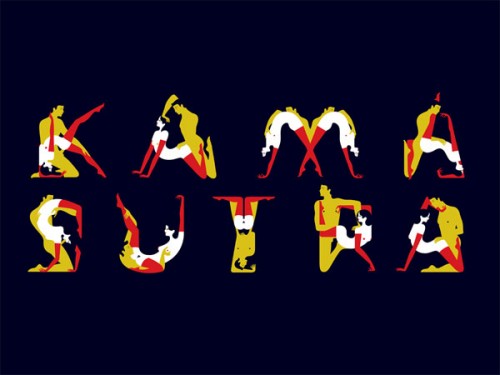During his lifetime, Gómez Dávila was a modest man and made few attempts to make his writings widely known. His first two publications were available only to his family and friends in private editions. Only by way of German (and later Italian as well as French and Polish) translations beginning in the late eighties did Gómez Dávila's ideas begin to disperse. Initially his works were more popular in Germany than in Colombia, and a number of prominent German authors such as Ernst Jünger (who in an unpublished letter defined Gómez Dávila's writing as: "A mine for lovers of conservatism"), Martin Mosebach, and Botho Strauß expressed their admiration for Gómez Dávila’s works. His most translated and final work, El Reaccionario Auténtico (The Authentic Reactionary) was published after his death in the Revista de la Universidad de Antioquia.
Gómez Dávila has many unique features that occur within his works, but perhaps the most famous literary feature he is famed for is the aphorism, which remains prominent throughout his writing. Not only is the aphorism used as an aesthetic tool, it is also a purposely deployed technique selected by Gómez Dávila as his method of choice, which he referred to as escolios (or glosses). This technique was used extensively in the five volumes of Escolios a un texto implícito (1977; 1986; 1992).
By definition, an aphorism is an original thought, spoken or written in a concise and memorable form; the term aphorism literally means a distinction or definition, coming from the Greek ἀφορισμός (aphorismós). In traditional literature, the aphorism is used as a mnemonic technique to relate wisdom and is found in works such as the Sutra literature of India, The Golden Verses of Pythagoras, Hesiod's Works and Days, the Delphic Maxims, and Epictetus' Handbook. In more recent times, the aphorism has been used heavily by philosophers such as Nietzsche and Cioran, both of whom share a number of ideas and perspectives with Gómez Dávila. Nietzsche himself used aphorisms heavily and even went so far as to describe why aphorisms are used – naturally in the form of an aphorism itself – “He who writes in blood and aphorisms does not want to be read, he wants to be learned by heart.” In regards to Gómez Dávila this is certainly the case, for he himself stated that aphorisms are like seeds containing the promise of “infinite consequences.” Thus, with a short but highly memorable sentence, an idea is planted in the mind of the reader, an idea that hopefully sprouts action, and with it consequences. Similarly in Notas, he stated that the only two “tolerable” ways to write were a long, leisurely style, and a short, elliptical style - since he did not think himself capable of the long, leisurely style, he opted for aphorisms. As indicated above however, Gómez Dávila’s use of the aphorism is not merely a stylistic reference; these short but effective phrases are part of his ‘reactionary’ tactic, which he hurls like bombs into readers minds – where they either detonate or take root, sprouting into the ‘consequences’ their author hoped for. In his own words, he describes his use of aphorisms:
[to] write the second way is to grab the item in its most abstract form, when he is born, or when he dies leaving a pure schema. The idea here is a cross burning, a light bulb. Endless consequences of it will come, not yet but [a] germ, and promise themselves enclosed. Whoever writes well but not touching the surface of the idea, [there] a diamond lasts. The ideas and plays extend the air space. Their relationships are secret, [their] roots hidden. The thought that unites and leads is not revealed in their work, but their fruits [are] unleashed on archipelagos that crop alone in an unknown sea.1
According to Gómez Dávila, in the modern era the reactionary cannot hope to formulate arguments that will convince his opponent, because he does not share any assumptions with his opponent. Moreover, even if the reactionary could argue from certain shared assumptions, modern man’s dogmatism prevents him from listening to different opinions and ideas. Faced with this situation, the reactionary should instead write aphorisms to illicit a response rather than engaging in direct debate. Gómez Dávila compares his aphorisms to shots fired by a guerrilla from behind a thicket on any idea that dares advance along the road. Thus, the reactionary will not convince his opponent, but he may convert him.2 Furthermore, the aphorisms themselves are not written in isolation – when placed together in their context they are equally as informative as any normally composed text could hope to be.
Another function that Gómez Dávila’s aphorisms served was, as their Spanish title (Escolios a un Texto Implícito) suggests, as notes on books he had read. The Spanish word escolio comes from the Greek σχόλιον (scholion). This word is used to describe the annotations made by ancient and medieval scribes and students in the margins of their texts. Many of these aphorisms may therefore be allusions to other works. They constitute the briefest of summaries of books he read and conclusions he had drawn from these works or judgments on these texts.3
Gómez Dávila was a truly devout Christian, and his strand of religious thought is deeply entwined with his ideas on politics, democracy and society as a whole. This is a central concept in understanding Gómez Dávila’s work. However, not all of his thoughts resonated with other religious thinkers of his era, for he realised that his contemporaries were incapable of revitalising either Christianity or Catholicism and thus were not able to ensure the survival of the church in the modern era. Not only did this aggravate some of his fellow Catholics, they also were wary of Gómez Dávila due to his appreciation of authors such as such as Nietzsche and Heidegger, who are not usually regarded as being affable to Christianity.
In regards to the way religion is combined with his political thought, Gómez Dávila, interprets democracy as “less a political fact than a metaphysical perversion” and is a harsh critic of ideology. He defines democracy as “an anthropotheist religion,” which he believes is a methodology that seeks to elevate the common man to a plane above God – which he believes to be a dangerous and unprecedented level of religious anthropocentricism. Though this may sound odd at first, Gómez Dávila is by no means the only author who has claimed that democracy incorporates a religious element into it, and even some contemporary political scientists have asserted that democracy functions as a political religion. Gómez Dávila interpreted the vital sign of democracy being a political religion as the modern state’s hostility to traditional religions, which he believed was because a true religious authority was capable of challenging a government – thus the power of religion has to be curbed in order for the government to have full, unmediated control of the people – and as a consequence of this a democracy had to replace religion by adopting ‘quasi-religious’ elements. It is this light, that contrary to public opinion, Gómez Dávila does not see democracy as a promise of liberation; on the contrary to him democracy represents a loss of freedom. Since democracy has achieved hegemony, spiritual and cultural matters have become secondary to politics, and today when a citizen is branded as a ‘heretic’ is not because of his rejection of a religion, but because they dare to question the controlling political regime. In this regard, Gómez Dávila questions democracy, but he should be regarded as a critic and not an opponent, for as mentioned earlier Gómez Dávila had no interest in a political agenda. To Gómez Dávila, democracy was a political religion that encouraged the exaltation of the cult of individualism to a dangerous status, which set an individual on an undeserved plateau above God and eroded genuine metaphysical belief but replaced it with nothing substantial. However he was not a blind devotee or fundamentalist either, for Gómez Dávila was also a powerful critic of the Church as well as democracy.
Another feature at play within Gómez Dávila’s writing is that he believes equality to be a social construct of modernity – whilst equality levels the playing field for some individuals, for others it hobbles them. Effectively, it creates a mythical average citizen who does not in actuality exist, raising one individual to an elevated position and demoting another. Rather than recognising individual qualities and merits, it removes all hierarchies – not only the negative hierarchies, but also the positive ones. All variation is lost and replaced by the ‘myth of the average’ – and if Gómez Dávila’s interpretation of democracy as a political religion is correct, it then denounces religion and evaluates the mythical ‘average citizen’ to a theoretical level of freedom wherein the ‘average citizen’ is a substitute for the very pinnacle of the religious hierarchy – God. Thus, Gómez Dávila criticises democracy because it seeks to replace the sacred with the average and mundane man. And because democracy replaces religion, it is for this reason that criticism of democracy is the taboo of the West, and the modern equivalent to heresy. Thus, the modern ideologies such as liberalism, democracy, and socialism, were the main targets of Gómez Dávila's criticism, because the world influenced by these ideologies appeared to him decadent and corrupt.
In order to critique ideas, Gómez Dávila created the figure of the ‘reactionary’ as his unmistakable literary mask which he developed into a distinctive type of thinking about the modern world as such. This is explained in The Authentic Reactionary, which refers to one of his most well-known works, El reaccionario auténtico, originally published in Revista Universidad de Antioquia 240 (April-June 1995), 16–19. By adopting this label, Gómez Dávila is defining himself as one who sits in opposition. This is not simply a matter of placing Gómez Dávila into a neat political pigeonhole for clearly defined and organised policies – because he turned down prestigious political positions, and certainly didn’t intend to advocate any political platforms in his literary work. The reactionary is for him not at all a political activist who wants to restore old conditions, but rather a “passenger who suffers a shipwreck with dignity”; the reactionary is “that fool, who possesses the vanity to judge history, and the immorality to come to terms with it.”4 He did not mean to identify himself exclusively with a narrow political position. In several aphorisms, he acknowledged that there is no possibility of reversing the course of history. Rather, the reactionary’s task is to be the guardian of heritages, even the heritage of revolutionaries. This certainly does not mean that Gómez Dávila made his peace with democracy; all it means is that he also did not allow himself to be deluded by promises of the restoration of the old order.5 As we see below;
The existence of the authentic reactionary is usually a scandal to the progressive. His presence causes a vague discomfort. In the face of the reactionary attitude the progressive experiences a slight scorn, accompanied by surprise and restlessness. In order to soothe his apprehensions, the progressive is in the habit of interpreting this unseasonable and shocking attitude as a guise for self-interest or as a symptom of stupidity; but only the journalist, the politician, and the fool are not secretly flustered before the tenacity with which the loftiest intelligences of the West, for the past one hundred fifty years, amass objections against the modern world.6
In this regard Gómez Dávila does not seek to eliminate the concept we know of as ‘modernity’, which he sees as an impossible task. Instead he provides a criticism of modernity, disputing that is natural and that it leads to a false conception of progress. The illusionary doctrine of progress, to Gómez Dávila’s way of thinking is a myth which has been deployed to help enslave workers to capitalism and industrial society, by effectively manipulating the population to believe that they helping to make the world a better place, when effectively the real event that is taking place is that they only serving to make capitalism and consumerism more efficient. The illusion of progress acts as a placebo effect to make the citizens feel better about themselves in a world where god and religion has long since perished, replaced by blind faith in the power of the state. “In order to heal the patient, which it wounded in the 19th century, industrial society had to numb his mind [to pain] in the 20th century.”7
By defending cultural and spiritual heritage, however, Gómez Dávila is not advocating a return to the past – rather be is strategically deploying this as a method to cut ties with the present and create a different future, for in his own words: "To innovate without breaking a tradition we must free ourselves from our immediate predecessors linking us to our remote predecessors".8 Gómez Dávila believes that "The modern world resulted from the confluence of three independent causal series: population growth, democratic propaganda, [and] the industrial revolution" (Successive Scholia, 161). This in turn led to further developments and propaganda which effectively restructured traditional belief and "replaced the myth of a bygone golden age of a future with the plastic age" (Scholia II, 88) leading us to a world where consumerism eventually will replace both religion and politics - "The Gospels and the Communist Manifesto pale, the future is in the hands of Coca-Cola and pornography" (Successive Scholia, 181).
Therefore Gómez Dávila’s stance, dispersed through an assortment of brief aphorisms, becomes much more perceptible to the casual reader in light of The Authentic Reactionary, which for English readers (who as yet are not able to read all of his writing in translation) becomes a pivotal key in understanding Gómez Dávila’s work. The reactionary does not act in isolation from history and modernity, rather he seeks to challenge what he perceives as a false doctrine of progress and looks back in retrospect not to recreate the ancient past, but rather to generate ideas which link modernity to tradition, in order to create real progress by offering an alternative to the current regime of mass consumerism, capitalism and other destructive political ideologies. It is incorrect to locate Gómez Dávila in any existing political paradigm, because there is simply nothing which matches his core ideas…and as such he is correctly identified as what he labelled himself – a ‘reactionary’. His reactionary stance comes close to touching on the topics at the core of writers such as Guénon and Evola, but in regard to linking spiritual and cultural decline to political origins, he actually goes further beyond their ideas to suggest that as an inevitable side product of consumerism, destroying belief in a higher power or God would benefit capitalism and help corporations control the people by encouraging self-indulgent attitudes. Thus politics replaces spirituality, and the citizen replaces god with disguised worship of the state, who in turn rewards them with consumerism. The authentic reactionary is someone who is aware of problems like this in society and provides an intellectual critique of the system whilst remaining aloof from it:
History for the reactionary is a tatter, torn from man’s freedom, fluttering in the breath of destiny. The reactionary cannot be silent because his liberty is not merely a sanctuary where man escapes from deadening routine and takes refuge in order to be his own master. In the free act the reactionary does not just take possession of his essence. Liberty is not an abstract possibility of choosing among known goods, but rather the concrete condition in which we are granted the possession of new goods. Freedom is not a momentary judgment between conflicting instincts, but rather the summit from which man contemplates the ascent of new stars among the luminous dust of the starry sky. Liberty places man among prohibitions that are not physical and imperatives that are not vital. The free moment dispels the unreal brightness of the day, in order that the motionless universe that slides its fleeting lights over the shuddering of our flesh might rise up on the horizon of the soul.9
The soul of Nicolás Gómez Dávila, the authentic reactionary, departed from his flesh in his beloved library on the eve of his 81st birthday, on May 17, 1994. Though achieving fame in Colombia, where his works are well read today, Gómez Dávila remains largely unread in the Occident. Whilst his writing achieved some popularity in Germany, much of it remains untranslated for English readers, which prevents his writing from reaching a wider audience. Hopefully a new generation of authors will appear to pick up the challenge of translating Gómez Dávila’s writing and help him achieve the recognition he deserves as a thinker and philosopher.
Main Works
Escolios a Un Texto Implicito: Obra Completa. Nicolas Gomez Davila, Franco Volpi.
July 2006.Villegas Editores.
Notas I, Mexico 1954 (new edition Bogotá 2003).
Textos I, Bogotá 1959 (new edition Bogotá 2002).
Sucesivos escolios a un texto implícito, Santafé de Bogotá 1992 (new edition Barcelona 2002).
Escolios a un texto implícito. Selección, Bogotá 2001.
El reaccionario auténtico, in Revista de la Universidad de Antioquia, Nr. 240 (April–June 1995), p. 16-19.
De iure, in Revista del Colegio Mayor de Nuestra Senora del Rosario 81. Jg., Nr. 542 (April–June 1988), p. 67-85.
Nuevos escolios a un texto implícito, 2 volumes, Bogotá 1986.
Escolios a un texto implícito, 2 volumes, Bogotá 1977.
Notes:
1 Volpi, F., An Angel Captive in Time
6 Gómez Dávila, N.,The Authentic Reactionary
7 Ibid.
8 Duke, O. T., Nicolás Gómez Dávila: Passion of Anachronism, in Cultural and Bibliographical Bulletin . Issue 40. Volume XXXII, 1997
9 Gómez Dávila, N.,The Authentic Reactionary




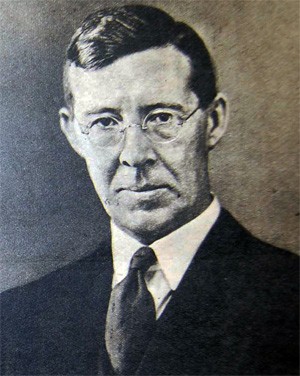
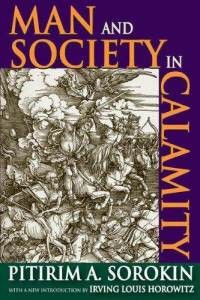 Sorokin was especially interested in the process by which societies change cultural orientations. He opposed the view, held by communists, that social change must be imposed externally, such as by a revolution. His principle of imminent change states that external forces are not necessary: societies change because it is in their nature to change. Although sensate or ideational tendencies may dominate at any given time, every culture contains both mentalities in a tension of opposites. When one mentality becomes stretched too far, it sets in motion compensatory transformative forces.
Sorokin was especially interested in the process by which societies change cultural orientations. He opposed the view, held by communists, that social change must be imposed externally, such as by a revolution. His principle of imminent change states that external forces are not necessary: societies change because it is in their nature to change. Although sensate or ideational tendencies may dominate at any given time, every culture contains both mentalities in a tension of opposites. When one mentality becomes stretched too far, it sets in motion compensatory transformative forces.
 del.icio.us
del.icio.us
 Digg
Digg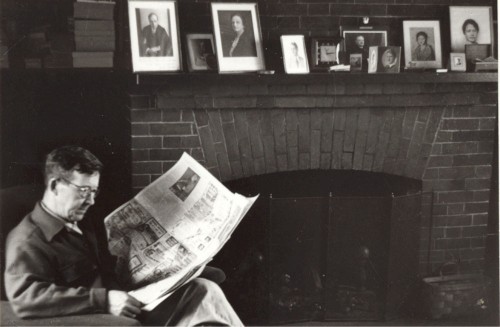





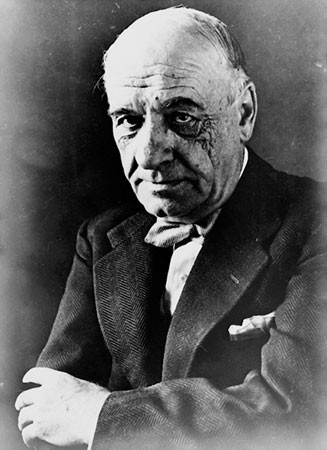 Dr. Ernst-Georg RENDA:
Dr. Ernst-Georg RENDA: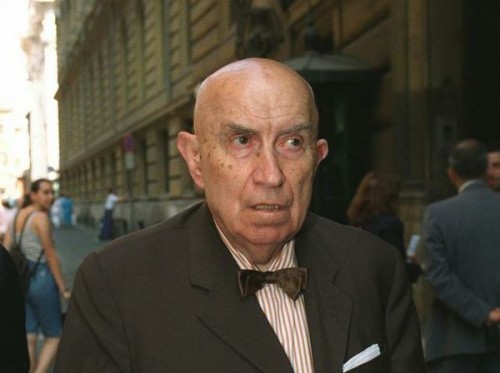











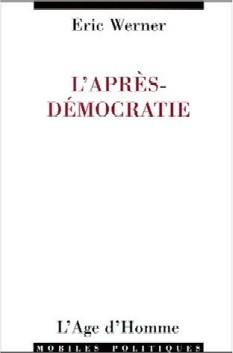


 In keeping with his contemptuous view of modernity, Evola regarded modern sexual mores and forms of expression as degenerate. Just as Evola rejected modern evolutionary biology, so did he also oppose twentieth century approaches to the understanding of sexuality of the kind found in such fields as sociobiology, psychology, and the newly emergent discipline of sexology. Interestingly, Evola did not view the reproductive instinct in mankind to be the principal force driving sexuality and he criticized these academic disciplines for their efforts to interpret sexuality in terms of reproductive drives, regarding these efforts as a reflection of the materialistic reductionism which he so bitterly opposed. Evola’s use of the term “metaphysics” with regards to sexuality represents in part his efforts to differentiate what he considered to be the “first principles” of human sexuality from the merely biological instinct for the reproduction of the species, which he regarded as being among the basest and least meaningful aspects of sex. It is also interesting to note at this point that Evola himself never married or had children of his own. Nor is it known to what degree his own paralysis generated by injuries sustained during World War Two as a result of a 1945 Soviet bombing raid on Vienna affected his own reproductive capabilities or his views of sexuality.
In keeping with his contemptuous view of modernity, Evola regarded modern sexual mores and forms of expression as degenerate. Just as Evola rejected modern evolutionary biology, so did he also oppose twentieth century approaches to the understanding of sexuality of the kind found in such fields as sociobiology, psychology, and the newly emergent discipline of sexology. Interestingly, Evola did not view the reproductive instinct in mankind to be the principal force driving sexuality and he criticized these academic disciplines for their efforts to interpret sexuality in terms of reproductive drives, regarding these efforts as a reflection of the materialistic reductionism which he so bitterly opposed. Evola’s use of the term “metaphysics” with regards to sexuality represents in part his efforts to differentiate what he considered to be the “first principles” of human sexuality from the merely biological instinct for the reproduction of the species, which he regarded as being among the basest and least meaningful aspects of sex. It is also interesting to note at this point that Evola himself never married or had children of his own. Nor is it known to what degree his own paralysis generated by injuries sustained during World War Two as a result of a 1945 Soviet bombing raid on Vienna affected his own reproductive capabilities or his views of sexuality.